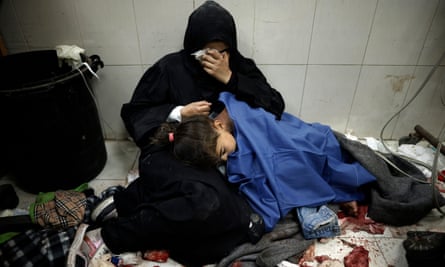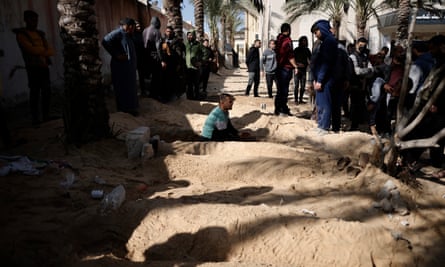The White House has called on Israel to protect innocent people as Palestinian officials said the Israeli military had stormed one hospital in Gaza and placed another under siege.
National security council spokesperson John Kirby said on Monday Israel had a right to defend itself but added: “We expect them to do so in accordance with international law and to protect innocent people in hospitals, medical staff and patients as well, as much as possible.”
Israeli troops advanced for the first time into Gaza’s al-Mawasi district near the Mediterranean coast, west of Khan Younis, the main city in the territory’s south, in what some Palestinians said was the bloodiest assault so far in January.
There, they stormed al-Khair hospital and were arresting medical staff, Gaza health ministry spokesperson Ashraf al Qidra told the news agency Reuters. The hospital is just inside the safe zone at Mawasi, where the Israeli military had said it would not carry out operations.
There was no word from Israel on the situation at the hospital, and the military spokesperson’s office had no comment.
The Palestinian Red Crescent said tanks had surrounded another Khan Younis hospital, al-Amal, headquarters of the rescue agency, which had lost contact with staff there.
“We are deeply worried about what is happening around our hospital,” said Tommaso Della Longa, spokesperson for the International Federation of Red Cross and Red Crescent Societies.
Qidra said at least 50 people were killed overnight in Khan Younis, while the sieges of medical facilities meant dozens of dead and wounded were beyond the reach of rescuers.

“The Israeli occupation is preventing ambulance vehicles from moving to recover bodies of martyrs and the wounded from western Khan Younis,” he said.
Volunteers with the Red Crescent also said strikes hit four schools west of Khan Younis – two of them inside the Mawasi “safe” zone – causing an unknown number of casualties. They said the organisation’s ambulances could not reach the sites.
Israel says Hamas fighters operate in and around hospitals, which Hamas and medical staff deny.
Elad Goren of COGAT, the Israeli defence ministry branch that coordinates with the Palestinians, added that: “A particular effort led by a dedicated team has been put on making sure civilians have access to medical care.”
Residents said the bombardment from air, land and sea was the most intense in southern Gaza since the war began in October.
Israel launched an offensive last week to capture Khan Younis, which it now says is the principal headquarters of the Hamas militants responsible for the 7 October attacks on southern Israel that killed 1,200 people, according to Israeli tallies.
On Monday the Israeli military claimed it had found weapons, explosives and rockets and destroyed tunnel shafts and underground infrastructure in recent days in Khan Younis. It also said three Israeli soldiers were killed on Monday in southern Gaza.
The newest phase of the war has brought fighting deep into the last corners of the enclave packed with those fleeing bombardment. At least 25,295 Gazans have been killed since 7 October, Gaza health authorities said in an update on Monday.
Most of Gaza’s 2.3 million residents are now penned into Rafah just south of Khan Younis and Deir al-Balah just north of it, crammed into public buildings and camps of tents made from plastic sheets lashed to wooden frames.
“This is the seventh time I get displaced,” Mariam Abu-Haleeb told the Reuters news agency, as she sat in a car surrounded by her possessions.
“Where should I go? Should I go to Rafah? Rafah is like one street. What do they want from us?” said Ahmad Shurrab, who was fleeing Khan Younis with his family and said he had also been displaced multiple times.
Ahmad Abu-Shaweesh, a boy, described sheltering in the Al-Aqsa University only to find it coming under attack. “We hardly made it out … We didn’t expect the tanks at the university’s gates,” he said.

Gaza has had no communications or internet service for 10 days, hampering ambulance dispatches to areas targeted by Israel and preventing people from checking on one another and on the whereabouts of Israeli forces.
At Nasser hospital, the only major hospital still accessible in Khan Younis and the largest still functioning in Gaza, video and photos showed the trauma ward overwhelmed with wounded being treated on a floor splashed with blood.
Reuters reported that graves were being dug within the hospital grounds because it was not safe to venture out to the cemetery. Authorities said 40 people were buried there.
In Brussels, Palestinian Authority foreign minister Riyad al-Maliki told reporters the situation in Gaza was out of control and asked the European Union to call for a ceasefire.
“The health system has collapsed. There is no way for injured Palestinians to be treated in the Gaza Strip and they are not able to leave Gaza for treatment outside.”
Israel says it wants to annihilate Hamas. But Palestinians and some western military experts say that may be unachievable given the group’s diffuse structure and deep roots in Gaza, which it has ruled since 2007.
Although Israelis overwhelmingly support the war, a growing number say the government should do more to reach a deal to free Israeli hostages, even if that means reining in its offensive.
About 20 relatives of hostages stormed a parliamentary committee session in Jerusalem on Monday, demanding lawmakers do more to help free their loved ones.
Prime minister Benjamin Netanyahu told a group of relatives there was no truth to reports of a deal to free hostages in a ceasefire.
Reuters and Associated Press contributed to this report
